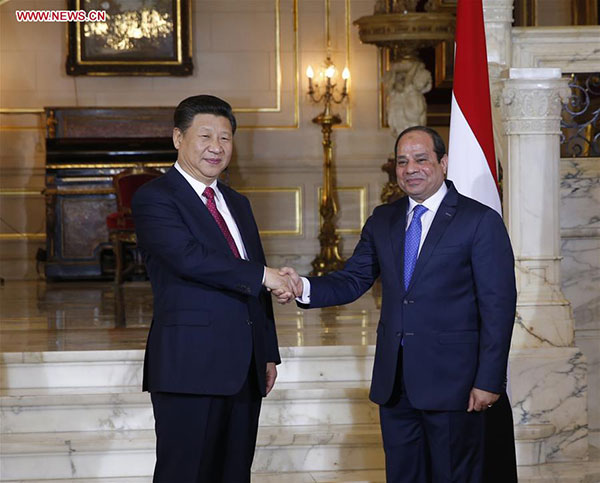China-Egypt model fits in well with B&R
- By Haifa Said
 0 Comment(s)
0 Comment(s) Print
Print E-mail China.org.cn, October 12, 2017
E-mail China.org.cn, October 12, 2017
|
|
|
File photo: Chinese President Xi Jinping(L) holds talks with Egyptian President Abdel-Fattah al-Sisi at Quba Palace in Cairo, Egypt, Jan 21, 2016.[Photo/Xinhua] |
In line with Chinese President Xi Jinping's underpinning motto of the increasingly momentous pan-Eurasian "Belt and Road" initiative, the fast-growing economic cooperation between Egypt and China is an exemplary "win-win situation," with China helping to boost Egypt's rising economy, while Egypt can be China's commercial portal in the Arab and African worlds.
Invited by his Chinese counterpart, Egyptian President Abdel Fattah el-Sisi attended the 9th BRICS summit held on September 3-5 in the Chinese city of Xiamen, seeking to give a further boost to Sino-Egyptian relations and viewing Xi's invitations as a "certificate of trust."
In his speech at China-Egypt Trade and Investment Promotion Conference held in Yinchuan city, Egyptian Trade and Industry Minister Tarek Kabil promised that the government will do everything necessary to facilitate Chinese investors' entry into the Egyptian market.
Kabil's promise is based on recent strategies and economic reform measures to promote industrial development and foreign trade for 2020 and 2030.
A major breakthrough in the growth of the two sides' relations was capped by approving the "Comprehensive Strategic Partnership" in December 2014, and the Executive Program to enhance the Partnership between 2016-2021.
Minister Kabil said China is Egypt's largest trading partner and Egypt is China's third largest trade partner in Africa. Trade exchange reached nearly US$11 billion last year and about US$5.2 billion in the first half of 2017.
Despite the increase witnessed in Egyptian exports in the same period, reaching US$325.8 million up from US$234.2 million in 2016, data indicate that the trade balance is in favor of the Chinese side, pushing Egypt to double up its efforts to achieve a trade balance.
Kabil added that China ranks 21st among foreign countries investing in Egypt with about 1,320 Chinese companies with a total investment of US$600 million, covering diverse areas in industrial, telecommunications and technology Information, infrastructure, economic zones and financing sectors.
With the B&R initiative as a trade artery connecting Asia, Africa and Europe, the position of Egypt, with its strategically-located Suez Canal lining the Mediterranean and the Red Sea, makes it an important line for Chinese companies to channel their investments along the "Silk Road."
Egypt may also be China's channel to access international markets through the former's trade agreements with many other countries, including Arab countries, and the Common Market for Eastern and Southern Africa, the EU-Egypt Association Agreement and the Free Trade Agreement with the EFTA and MERCOSUR and the Qualifying Industrial Zones (QIZ), which allow products of Egyptian origin to reach nearly 1.8 billion people worldwide.
Ahmed Mounir, chairman of the Economic Committee and Cooperation with China at the Egyptian Businessmen Association, considers that Egypt stands as the spearhead of China's entry in 26 African countries. "China's industrial city in Egypt is China's first city in Africa, so we believe that the Chinese side is seeking a greater presence in the Egyptian market," Mounir said in a press interview.
In a press conference at the Chinese Embassy in Cairo in late August, Ambassador Song Aiguo said that Sino-Egyptian relations have been on the rise, noting that Egypt sees the "New Administrative Capital" as a giant project apt for China's giant economy, and that it has a main goal to attract some of the ten thousand Chinese companies moving their capital outside China to expand in world countries.
The mega-project of the "New Cairo Capital" -- listed as one of the world's biggest eight urban projects, will be a 270-square-mile hub with 21 new residential districts -- enough housing for five million people. It will cost around US$45 billion and be complete by 2022. Construction began in 2015.
A bilateral agreement was signed regarding railway construction after the completion of the final route of an electric train linking the new administrative capital on the Suez/Cairo desert road, which extends 170 km and includes 14 stations.
Song said that financial cooperation has also improved through the US$2.6 billion currency swap deal between China and Egypt and the joint Suez Economic and Trade Cooperation Zone in the Ain Sokhna district of the Suez Canal Corridor.
He stressed that trade exchanges have increased steadily since 2010, amounting to over US$12 billion, with Chinese investments increasing by US$$420 million in 2016. Song also put the increased number of Chinese tourists to Egypt in 2016 at 180,000 from 100,000 in 2010.
The Egyptian participation in the BRICS summit yielded several cooperation agreements with China in the fields of agricultural exports, information technology, automobiles, fiber glass manufacturing and increasing the capacity of the Egyptian national electricity grid.
All that and more makes Egypt an eligible candidate to fit in with China's approach to expand the BRICS and create "BRICS Plus."
Haifa Said is chief editor of Syria Arab News Agency.
Opinion articles reflect the views of their authors, not necessarily those of China.org.cn.







Go to Forum >>0 Comment(s)